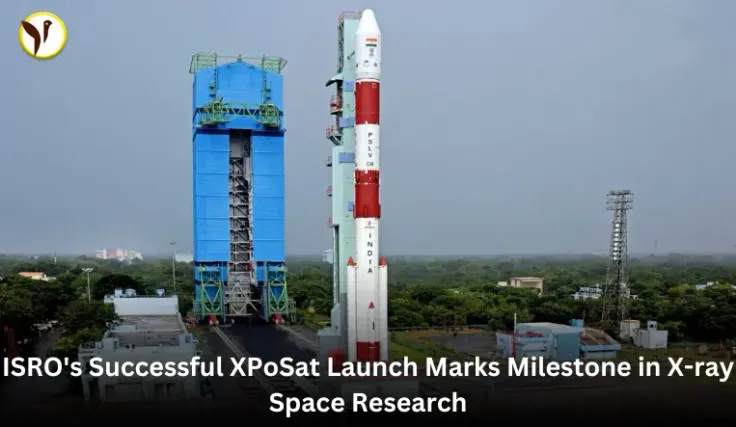In a triumphant start to the New Year, the Indian Space Research Organisation (ISRO) achieved success with the PSLV-C58 mission, marking a significant milestone with the launch of XPoSat along with 10 other payloads. XPoSat, India’s maiden dedicated scientific satellite, aims to conduct pioneering research in polarisation measurements of X-ray emissions from celestial bodies, including enigmatic black holes.
Also Read, Ayodhya's Sustainable Planning: Balancing Resident Needs Amid Tourist Influx
The launch took place at 9.10 am from the Satish Dhawan Space Centre in Sriharikota, where the PSLV-C58 carried XPoSat into an eastward low inclination orbit of 650km approximately 22 minutes after liftoff. Following XPoSat's injection, the rocket's PS4 stage was utilized twice to adjust the orbit to a stabilized 350km circular orbit, facilitating optimal conditions for orbital platform experiments. The successful execution of the PSLV orbital experimental module-3 (POEM-3) met the objectives of the 10 identified payloads supplied by ISRO and InSpace.
ISRO Chairman S Somanath expressed satisfaction, highlighting this success as a precursor to a bustling year ahead, notably with plans for Gaganyaan, two upcoming test flights, and a packed schedule including PSLV, GSLV, and SSLV launches.
XPoSat, weighing 469kg, carries two essential payloads—Polix (Polarimeter Instrument in X-rays) and Xspect (X-ray Spectroscopy and Timing)—developed by Raman Research Institute and Space Astronomy Group of URSC, respectively. The mission aims to measure the polarization, spectral, and temporal aspects of X-ray emissions from approximately 50 cosmic sources, enhancing understanding about black holes, neutron stars, and active galactic nuclei.
V Narayanan, director of the Liquid Propulsion Systems Centre, highlighted XPoSat's significance as only the second satellite globally dedicated to studying X-ray polarisation. Brindaban Mahto, the satellite director, expressed optimism about XPoSat's contributions to the global scientific community once it's commissioned. Additionally, alongside XPoSat, the PSLV carried 10 other payloads from various institutions and private entities, including Women Engineered Satellite, BeliefSat0, radiation shielding experimental module, Green Impulse Transmitter, and Technology Demonstrator, among others.
Also Read: India's GDP Growth Set to Surpass 6.5% in FY24, Signals Strong Economic Momentum
The successful launch of XPoSat not only signifies India's advancements in space exploration but also holds promise for significant breakthroughs in understanding cosmic phenomena, contributing to the broader scientific community's knowledge and discoveries.







